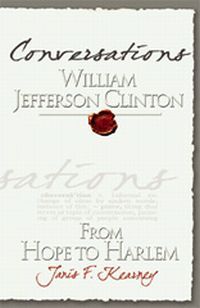 SHIELD OF SPARROWS |
 Sunshine, secrets, and swoon-worthy stories—June's featured reads are your perfect summer escape. |

Purchase
Writing Our World Press Non-Fiction Biography Excerpt of Conversations by Janis F. KearneyPresident William Jefferson Clinton spent most of his youth in the city of Hot Springs, Arkansas, located almost halfway between the state capital, where he would spend the balance of his adult life, and his birthplace, Hope, Arkansas. It was 1953 when seven-year-old Billy Blythe moved with his mother and her new husband, Roger Clinton, to Hot Springs, Arkansas, where Roger would continue work with the Clinton Buick company. Mrs. Virginia Cassidy Blythe Clinton would become a popular nurse anesthetist with the Hot Springs Ouachita Hospital, where she would come to be known at the best in the area. By the time the Clinton family moved to Hot Springs, it was a city reborn, having bounced back from the trouncing it took from the Civil War and become an internationally renowned tourist town. This quaint yet progressive community boasted a population that included many non-southerners and some foreigners. Despite Arkansas's reputation as backward and insular, Hot Springs attracted nationally recognized entertainers and well-known celebrities who enjoyed the “freedom” of the town, including it medicinal spas and open gambling. Was the political timbre of the town as left-leaning as was its social environment? The Sentinel Record, on June 26, 1959, wrote that Representative Ray S. Smith, Jr., of Hot Springs was recognized for his courageous civil rights move in casting the lone vote against Governor Orval Faubus's school closing bill in 1959. Smith received the Edmond G. Ross Award, named for Senator Ross of Kansas, who had sacrificed his political career by casting a deciding vote against the impeachment of Andrew Johnson. Bill Clinton was eleven years old in 1957, when Arkansas became infamous around the world for the Integration Crisis of Central High School. That one incident, Clinton would later say, symbolized much of what he would spend his life fighting against. In an interview that took place during his presidency, he reflected on those tumultuous early years of integration in Arkansas. “I was only 11 years old when the nation's attention was riveted by the scene of nine black children being escorted by armed troops on their first day of school in Little Rock's Central High School... it had a profound impact on me.” “I was concerned about the racial separation between blacks and whites that was taken for granted by so many of my neighbors and friends. When I was a very young boy in Hope, I spent time in my grandfather's grocery store. Many of his customers were poor and black, but he treated everyone, black or white, with the utmost dignity and respect. I often played with black children. My grandfather tried to explain why a little black boy I played with couldn't go to school with me, or why the streets in the black neighborhood were not paved like the streets in the white part of town. My grandparents were not well educated or well off and I don't know how they came to break from the conventional white opposition to racial equality, but I'm so grateful to them for what they taught me.” During the ten years Bill Clinton spent in Hot Springs before going off to college, he would shed much of his rural, small town persona and begin to assimilate comfortably into the more cosmopolitan Hot Springs environment. He would also shed the name that had been his biological father's and take on his stepfather's surname. No longer Billy Blythe, he became William "Bill" Clinton. His peers saw in him a bright, popular young man with an infectious personality and a natural talent for music, especially the saxophone. In March 1963, he was selected as co-first chair for the tenor saxophone; it was the first time Hot Springs High School had ever awarded two first chair winners. He was never very involved in school sports but had a great interest in cars and could often be found hanging out at the Clinton Buick dealership. He graduated with honors from Hot Springs High School in 1963, and his peers predicted that in 20 years he would become “a social worker in a prairie dog colony.” Hot Springs, though, with all its exotic airs, was still the South. Bill Clinton attended a segregated elementary school and high school. The Clinton family lived in the white part of town and had the privilege of eating in the segregated restaurants and watching movies in segregated theatres. Although the Cassidys' instilled in Clinton the importance of looking beyond race, his new home, Hot Springs, might well have taught him a practical lesson about the importance of presenting a racially harmonious face to the visitors to the city. Most of those visitors, after all, came from a more liberal North. While both of the cities Bill Clinton would call home -Hot Springs and Hope-had been proud participants in the Confederacy during the Civil War, the two cities' similarities went little further than that. Hot Springs' outside-the-box persona likely had much to do with Bill Clinton's joie de vivre and, maybe, his open acceptance of people and situations that others find harder to accept. It was during the '50s and '60s that the unarticulated questions that pestered young Billy Blythe in Hope, Arkansas, began to reintroduce themselves in the form of what was happening within and outside the state. During the height of the civil rights struggle, the teen was introduced, through television, to Reverend Martin Luther King; and memorized the entire “I Have a Dream” speech. His deep-felt sensitivities on race began to bud, and it was there, that he forged his own philosophies and ideals about America's race conflicts. Those theories and ideals, for the most part, would remain with him. Excerpt from Conversations by Janis F. Kearney |
|
| |||
|
||||



 © 2003-2025
© 2003-2025